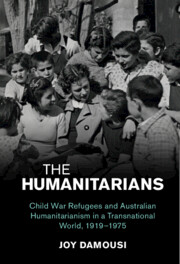 The Humanitarians
The Humanitarians Cecilia John, Meredith Atkinson and the Paradox of Child-Saving Politics
from Part I - Saving
Published online by Cambridge University Press: 28 July 2022
Chapter 1 explores the campaigns of Cecilia John, Meredith Atkinson and the Save the Children Fund, which in Australia was formed in 1919. John established an Australian branch after attending the Women’s International Peace Congress in Zurich in 1919 with feminist Vida Goldstein, where she witnessed the horror of images of starving children in Europe, which left an indelible impact on her. A biographical study of John provides a framework through which to bring together disparate parts of her life that have been studied in isolation. Previously, her national and international efforts have been discussed separately. Integrating these studies has revealed, I argue, not a continuum of political ideals but contradictions. During the First World War, John critiqued the British Empire for draining the blood of Australia’s men on the battlefields of Europe, but after the war, she eulogised the Empire for rescuing starving and destitute children through Save the Children. She appears not to bring these politics into Save the Children, however, focusing instead on the desperate plight of starving children in an apolitical framework. The emotive, apolitical appeal of rescuing starving children seemingly sat without the complications of her earlier proclamations. Privileging sentimentality in the cause of destitute children, void of political or critical analysis, was a challenge the journalist and educator Meredith Atkinson encountered too, as he attempted to promote the cause of Russian children caught in the civil war.
To save this book to your Kindle, first ensure [email protected] is added to your Approved Personal Document E-mail List under your Personal Document Settings on the Manage Your Content and Devices page of your Amazon account. Then enter the ‘name’ part of your Kindle email address below. Find out more about saving to your Kindle.
Note you can select to save to either the @free.kindle.com or @kindle.com variations. ‘@free.kindle.com’ emails are free but can only be saved to your device when it is connected to wi-fi. ‘@kindle.com’ emails can be delivered even when you are not connected to wi-fi, but note that service fees apply.
Find out more about the Kindle Personal Document Service.
To save content items to your account, please confirm that you agree to abide by our usage policies. If this is the first time you use this feature, you will be asked to authorise Cambridge Core to connect with your account. Find out more about saving content to Dropbox.
To save content items to your account, please confirm that you agree to abide by our usage policies. If this is the first time you use this feature, you will be asked to authorise Cambridge Core to connect with your account. Find out more about saving content to Google Drive.